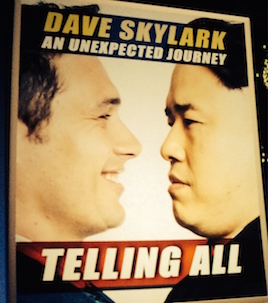| « North Korea: Longstanding US Punching Bag | Global Peace, War and the Xmas: Killing Goes On » |
The Interview: A Review and Comment on the General Hysteria
Michael Collins

The Interview looked like it would become the best-known movie that was never seen. The core narrative involves two buffoonish United States media personalities heading to North Korea to interview supreme leader Kim Jong-il. Before they leave, the CIA recruits them to assassinate Kim. Lacking any underlying sense of moral and personal integrity, show host Dave Skylark (James Franco) and his producer, Aaron Rapaport (Seth Rogan), accept the assignment. (Image: The Interview - Wikipedia)
The leader of North Korea, the real Kim Jong-il, took exception to a big screen portrayal of a plot on his life in June. In November, a major hack to Sony Pictures and Entertainment's computing systems was attributed to a mysterious cadre of hackers in North Korea. When major theater chains said they wouldn't carry the film, Sony had enough. The company cancelled release of the film.
The ensuing controversy publicized the film in ways Sony could only imagine. Then, President Obama weighed in endorsing the release of the film. The prospect of a huge payday plus official endorsement from the President contributed to Sony's revised decision. The company announced that The Interview would be available soon on cable or internet pay per view. In addition, Sony made the film available to a group of independent cinemas known as the Art House Convergence after the cinemas signed an open petition on Change.org.
Alamo Drafthouse Cinemas opened the film at its 18 cinema-restaurant locations throughout the country. I saw the film at Alamo's theater in Ashburn, Northern Virginia, near Washington, DC. I survived to do this review.
Excellent Movie - See it
The film isn't for everyone, particularly those who can't tolerate foul language, funny (hilarious at times) but very crude sexual and scatological humor, and an absurdist plot that has little redeeming value other than entertaining humor. Those looking for highly entertaining humor, a clever plot, and outstanding comedic performances will enjoy just about every minute.
Dave Skylark (James Franco) is perhaps the most superficial television interviewer of all time. The story opens with Dave interviewing Eminem (playing himself). In the midst of the interview, Eminem says, "When I say things about gay people, or people think my lyrics are homophobic - it's because I'm gay." As Skylark follows up, Aaron Rapaport (Seth Rogan), his ace producer, jumps for joy at the exclusive.
After this coup, Rapaport receives a call from a North Korean diplomat who invites Skylark to do an interview with supreme leader Kim Jong-il. This coincides with stories about the North Korean nuclear threat to the West Coast of the United States. After the interview is arranged, two CIA agents, Lacey (Lizzy Caplan) and Botwin (Reese Alexander), solicit Skylark for a plot to assassinate Kim.

The stage is set for the interview and the calamitous action surrounding it. If you make it this far without being seriously offended, the balance of the film offers one laugh after another. The actors show that they find literally nothing too degrading or demeaning to get a laugh. Randall Park is absolutely brilliant as Kim as is Diana Bang as Sook, Kim's closest aid. (Image: Randall Park as Kim screenshot)
The dialog is clever and the cinematography excellent, largely because it is unobtrusive. In one scene, Skylark tells Sook, "Kim must die." Sook responds, "How many times can America make the same mistake." Franco's response: "As many times as it takes." In another scene, Kim shows Skylark his collection of vehicles, expensive cars plus a mint condition World War II Soviet tank. As Skylark marvels at the tank, Kim says, 'That was a gift to my father from Stalin." Skylark responds, "In my country we pronounce that Stallone."
Portraying the actual leader of North Korea, Kim Jong-il, with a character by the exact same name as a target for assassination pushes the edge of the entertainment envelope in a serious way. This is, no doubt, the source of North Korea's anger. Someone said, 'How would Americans react if someone made a movie about assassinating Obama." Americans would be extremely upset. Nevertheless, The Interview is made, released, and very much worth seeing. (Official trailer)
Hysteria surrounding North Korea attack narrative follows familiar pattern
The narrative of the massive hack of Sony Pictures and Entertainment's enterprise computing system followed a familiar pattern. The attack was announced. Shortly after the attack, an evildoer was blamed. Then, with the appropriate political frame, the jingoism began.
A LA Times headline broke the story on November 24: Hack at Sony Pictures shuts computer system. No culprit was named. Reporting focused on the volume of materials released. Based on the pervasive nature of the control by hackers, the LA Times suggested that hackers gained access "to login information for an IT administrator, then uses those credentials to sniff around the network."
By December 1, the Wall Street Journal ran a story that pointed to North Korea as the likely party behind the hack. The article used unattributed information from "people briefed on the investigation" as proof for the claim. This was an easy claim to make in view of North Korea's statements in June that the film's release would be an "act of war." By December 19, President Obama accused North Korea of cyber terrorism based on the FBI's conclusion that North Korea was behind the hack.
As it turns out, serious commentators are taking apart the North Korea did it theme in a convincing way. Risk Based Security began a chronology and analysis on December 5 that laid the foundation for questioning North Korea as the culprit. Kim Zetter's article in Wired on December 17 summarized emerging doubt: The Evidence that North Korea Hacked Sony is Flimsy. On December 18, blogger Marc Rogers offered a detailed explanation of Why the Sony hack is unlikely to be the work of North Korea.
After the all the drama and hysterics about secreted, geniuses culled from North Korea's population who hack governments and businesses around the world, we are now left with serious doubts.
The doubts and truth about this story are no more important than the doubts and truth of other major stories involving opponents of the rulers of the U.S. over the past few years. Once the White House makes the accusation, the accusation sticks. Truth is a mere inconvenience to be brushed away when it emerges. Review the following examples if you doubt this assertion.
The U.S. and its allies accused Libyan dictator Muammar Gaddafi of using military forces against peaceful demonstrators. This justified a major intervention that toppled Gaddafi. A comprehensive study by Alan Kuperman at Harvard's Belfer Center found that the demonstrations were violent from the start and that Gaddafi did not use indiscriminate military against peaceful demonstrators. (Image: The Interview screenshot)

The White House was absolutely apoplectic in its attack on the Syrian government, blaming the Assad regime for the chemical attack against civilians in a Damascus suburb. This conclusion was used to justify the president's plan to attack Syria in support of U.S. sponsored rebels. In fact, based partially on information released by the White House, it turns out that the deadly chemical weapons were fired by a missile with a 2 km range. The rebels controlled territory with a five-km radius of the site of attack. Therefore, either the rebels undertook the attack or Syrian forces were somehow able to penetrate to that previously impenetrable line of battle and fire the missile. That fact was simply not reported and, to this day, the false narrative survives justifying ongoing support for rebels in a civil war that has cost 200,000 lives and destroyed a nation.
The shoot down of Malaysian flight MH17 followed the same pattern. The tragedy took place and within days, the White House blamed Russia and forces resisting Ukraine's Kiev coup based government. The evidence wasn't there but that didn't matter. The politics of blaming Russia and the resistance supported the overall strategy of destabilizing a nation right on Russia's border.
Truth or the attempt to arrive truth is passé for U.S. rulers, particularly president's George W. Bush, and Barack Obama. When a horrible event takes place, make up a narrative blaming your enemies almost immediately, and dare people to challenge it. Then, consistently ignore any new evidence pointing to the likely truth as you take actions based on the original baseless assertion.
It's simple but highly effective propaganda. It might as well have come from Hollywood.
Creative Commons
N.B. The alleged Sony hackers, #GOP, made a video in response to the FBI's conclusions about North Korea entitled, "You are an idiot" on December 21 (click image for video)



